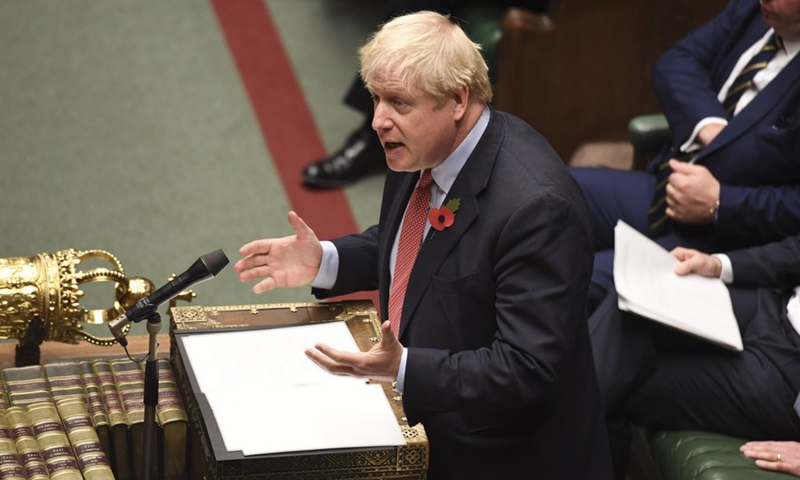
British Prime Minister Boris Johnson speaks at the House of Commons in London, Britain, on Oct 29, 2019. File photo:Xinhua
Indian Minister of External Affairs S. Jaishankar held talks with UK Foreign Secretary Dominic Raab on Tuesday, saying both countries would strengthen strategic cooperation in the Indo-Pacific and confront "shared security threats." Indian media said this alluded to China.
The UK's coming all the way to the Pacific to strengthen relations with India is one move to expand its diplomatic ties to the Asia-Pacific region in the wake of Brexit. UK Prime Minister Boris Johnson called out the ambitious slogan of "Global Britain" to play a greater role in the post-Brexit era on the international stage and to revitalize its global influence. Enhancing its presence in the Pacific region is a major part of this big plan. The UK's 2021 Integrated Review of Security, Defence, Development, and Foreign Policy also indicated that London needs to ensure greater leverage in the Indo-Pacific area.
For India, this is just another good opportunity to interact more closely with non-US powers to contain China. Both London and New Delhi hit it off and adjusted their diplomatic strategies in the same direction to jointly target Beijing. This also shows how countries in the "middle zone" between China and the US might interact with each other horizontally. They could huddle together to highlight their own presence and value in today's world.
London announced on Tuesday that Johnson will make his first bilateral visit to India in January. Meanwhile Johnson also invited India, South Korea and Australia to the G7 summit meeting next year. It can be seen that the two countries intend to continue to strengthen their relations.
China, surely, will respond calmly and remain unflappable to whatever kind of enhanced cooperation between the UK and India on issues of security or in other areas. However, if the interaction between the two countries occurs at the expense of China's interests in security and development, China will undoubtedly take counter-measures.
In the Asia-Pacific region, where ASEAN, Japan and South Korea are all key stakeholders, any move that destabilizes the region might cause a domino effect and affect the whole situation. China will work with peace-loving countries to deal with this new geopolitical dynamic to maintain regional stability and prosperity.
The Times of India on Tuesday used "ambitious" to describe the 10-year roadmap for India-UK ties. But how deep will the two sides' cooperation actually be? This still remains a question. India and the UK are taking advantage of each other because they have different priorities in the Indo-Pacific region. Their needs are contradictory. India wants to develop its own version of the Indo-Pacific Strategy and be a so-called net security provider in the Indian Ocean, trying to prove that it is still the gatekeeper and guardian of the ocean. After all, the UK is an extraterritorial power and India has an instinctive vigilance against it.
In addition, the roles of the two countries have also been reversed. Though India used to be a British colony, it now considers itself as an emerging power that has risen. Psychologically, India looks down on the declining empire. Thus, the two sides' cooperation will be limited. Given the suboptimal relations of recent years due to issues such as Kashmir, the two countries are in fact not immune to a tidal wave.
Following France and Germany, the UK is another European power participating in the Indo-Pacific region. The US is the main reason why these European powers are paying increasing attention to the region. The US wants to use its allies to promote its "smart power," and bring these NATO allies to the Asia-Pacific region to share its responsibilities. The US' national power is declining. Hence, it wants to use its allies to safeguard its own geopolitical interests.
And while these extraterritorial European countries want to contain China, they have to worry about their limited strengths. They know that if they seriously disrupt regional affairs, their tricks will fail.
The author is the deputy director of the Department for Asia-Pacific Studies at China Institute of International Studies. opinion@globaltimes.com.cn




